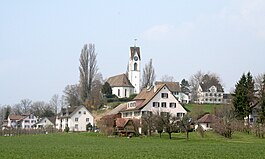Uetikon am See
| Uetikon am See | ||
|---|---|---|
 |
||
|
||
| Coordinates: 47°16′N 8°41′E / 47.267°N 8.683°ECoordinates: 47°16′N 8°41′E / 47.267°N 8.683°E | ||
| Country | Switzerland | |
| Canton | Zurich | |
| District | Meilen | |
| Area | ||
| • Total | 3.46 km2 (1.34 sq mi) | |
| Elevation | 450 m (1,480 ft) | |
| Population (Dec 2015) | ||
| • Total | 5,981 | |
| • Density | 1,700/km2 (4,500/sq mi) | |
| Postal code | 8707 | |
| SFOS number | 0159 | |
| Surrounded by | Egg, Männedorf, Meilen, Oetwil am See, Wädenswil | |
| Website |
www SFSO statistics |
|
Uetikon am See is a municipality in the district of Meilen in the canton of Zürich in Switzerland.
Uetikon am See is first mentioned in 1150 as Uotinchova. Until 1924 it was known as Uetikon.
Uetikon am See has an area of 3.5 km2 (1.4 sq mi). Of this area, 47.1% is used for agricultural purposes, while 16.9% is forested. The rest of the land, (36%) is settled. In 1996[update] housing and buildings made up 28.9% of the total area, while transportation infrastructure made up the rest (6.9%). As of 2007[update] 41.3% of the total municipal area was undergoing some type of construction.
It is located on the north bank of the Lake Zürich in the Pfannenstiel region. Uetikon is located about halfway between Zürich and Rapperswil. In the local dialect it is called Üetike.
The municipality includes the two sections of Uetikon known as Kleindorf and Grossdorf as well as the old settlements of Langenbaum, Oberstmatt, Grüt, Rundirain and Weid. Uetikon is home to a chemical factory of the same name. Except for the chemical plant, the harbour and the train station, most of the municipality is located a bit uphill from the lake.
Uetikon am See has a population (as of 31 December 2015) of 5,981. As of 2007[update], 14.9% of the population was made up of foreign nationals. As of 2008[update] the gender distribution of the population was 48.4% male and 51.6% female. Over the last 10 years the population has grown at a rate of 29.8%. Most of the population (as of 2000[update]) speaks German (89.1%), with Italian being second most common (2.7%) and Albanian being third (1.4%).
...
Wikipedia




